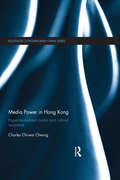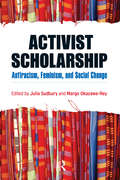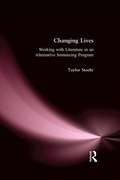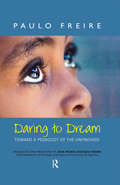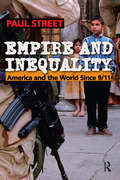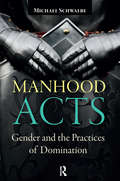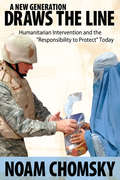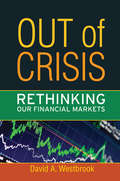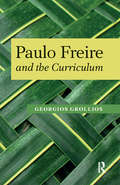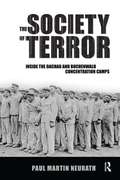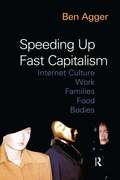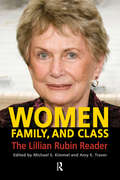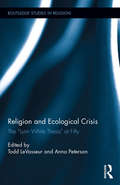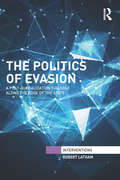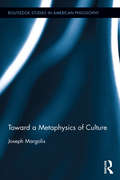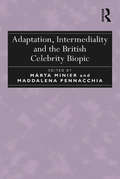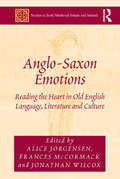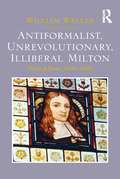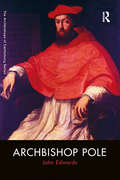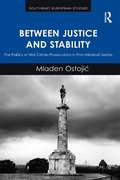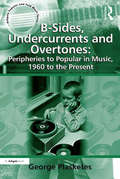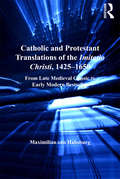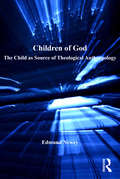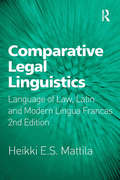Special Collections
Benetech’s Global Certified Accessible Titles
Description: Benetech’s GCA program is the first independent third-party EPUB certification to verify ebook accessibility. By creating content that is born accessible, publishers can meet the needs of all readers. Learn more: https://bornaccessible.benetech.org/
- Table View
- List View
Media Power in Hong Kong
by Charles Chi-wai CheungStudies of Hong Kong media primarily examine whether China will crush Hong Kong’s media freedom. This book however traces the root problem of Hong Kong media back to the colonial era, demonstrating that before the resumption of Chinese sovereignty there already existed a uniquely Hong Kong brand of hyper-marketized and oligopolistic media system. The system, encouraged by the British colonial government, was subsequently aggravated by the Chinese government. This peculiar system is highly susceptible to state intervention and structurally disadvantaged dissent and marginal groups before and after 1997. The book stresses that this hyper-marketized media system has been constantly challenged. Through a historical study of media stigmatization of youth, this book proposes that over the years various counter forces have penetrated the structurally lopsided Hong Kong media: independent, public, popular and news media all make occasional subversive alliances to disrupt the mainstream, and news media, with a strong liberal professionalism, provide the most subversive space for challenging cultural hegemony. The book offers an alternative and fascinating account of the dynamics between hegemonic closure and day-to-day resistance in Hong Kong media in both the colonial and post-colonial eras, arguing that the Hong Kong case generates important insights for understanding ideological struggles in capitalist media.
Disjunctivism
by Matthew SoteriouIt is commonly held that the experiences involved in cases of perception, illusion and hallucination all have the same nature. Disjunctivists deny this. They maintain that the kind of experience you have when you perceive the world isn’t one you could be having if you were hallucinating. A number of important debates in the philosophy of mind and epistemology turn on the question of whether this disjunctivist view is tenable. This is the first book-length introduction to this contested issue. Matthew Soteriou explains the accounts of perception that disjunctivists seek to defend, such as naïve realism, and the accounts to which they are opposed, such as sense-datum theories and representationalist theories. He goes on to introduce and assess key questions that arise in these debates: Is disjunctivism consistent with what has been established by the science of perception? Does introspective reflection support naïve realism? Can disjunctivism be motivated by appeal to the role that perception plays in enabling us to think demonstratively about mind-independent objects and qualities in our environment? Does disjunctivism offer the best account of perceptual knowledge? What can disjunctivists say about the nature of hallucination and illusion? Including chapter summaries, annotated further reading and a glossary, this book is an ideal starting point for anyone studying disjunctivism for the first time, as well as for more advanced students and researchers.
Activist Scholarship
by Margo Okazawa-Rey and Julia SudburyCan scholars generate knowledge and pedagogies that bolster local and global forms of resistance to U.S. imperialism, racial/gender oppression, and the economic violence of capitalist globalization? This book explores what happens when scholars create active engagements between the academy and communities of resistance. In so doing, it suggests a new direction for antiracist and feminist scholarship, rejecting models of academic radicalism that remain unaccountable to grassroots social movements. The authors explore the community and the academy as interlinked sites of struggle. This book provides models and the opportunity for critical reflection for students and faculty as they struggle to align their commitments to social justice with their roles in the academy. At the same time, they explore the tensions and challenges of engaging in such contested work.
Changing Lives
by Taylor StoehrChanging Lives recounts the experiences of a dozen men on probation in Massachusetts who took classes for three months to read and talk about great works of literature. The men explored the writings of Malcolm X, Leo Tolstoy and Anton Chekhov, amongst others. In these writings the men discovered many issues relating to their own lives, such as substance abuse, family breakdown, poverty and racism. The lessons create a safe space for reflection and earnest conversation, in which the students no longer have to bluff or be cool, guarded, or evasive. And because the classroom puts them on equal footing with authority figures - teachers, probation officers and even judges - a new social awareness begins to emerge. Changing Lives shows how reawakening moral consciousness and a fresh commitment to society is essential if probationers are not to cycle endlessly through the limbo of street life and jail time.
Daring to Dream
by Paulo Freire and Donaldo Macedo and Ana Maria Freire-- New from the author of the million-selling Pedagogy of the Oppressed -- In an era when teachers and states are resisting high-stakes testing, this new book from world-renowned author Paulo Freire could not be more timely. Freire's uplifting message u
Empire and Inequality
by Paul Street"This is an impressive collection: well-informed, well-written, covering highly important topics over an impressive range, with no hesitation about taking an honest stand that gets right to the heart of the matter in case after case." Noam Chomsky A frequent columnist in Z magazine, Black Commentator, and other magazines, Paul Street has closely monitored the deterioration of civil liberties since 9/11. In his new book, Street challenges the widely accepted notion that 'everything changed' on 9/11. The event of 9/11 changed the lives of thousands of people in tragic and lasting ways, but some things it did not drastically alter were the long-term goals of the Bush administration. Rather, the terrorist attacks offered a way for them to fully realize these goals, through waging war against fictional enemies abroad and against civil liberties at home. By pointing out rampant injustices in society and doggedly pursuing the blatant contradictions in current government policies, Street reveals a very different America than the government or media portray. Empire and Inequality shows how the jetliner attacks provided a windfall opportunity to accelerate pre-existing trends towards greater global and domestic hierarchy, inequality, and repression. Street shows how the elites of American government and business used classic propaganda mechanisms in pursuit of this regressive and authoritarian agenda in the "post-9/11 era." Street offers a cogent critique of the myth of the powerless state, showing that U.S. government's cup runs over when it comes to serving the wealthy and privileged few and is empty only when it comes to meeting the needs of the non-affluent majority. Empire and Inequality is a powerful reflection on the inseparable, deepening, and mutually reinforcing relationships that exist between empire abroad and inequality and repression at home in the "post 9/11 era."
Manhood Acts
by Michael SchwalbeIn Manhood Acts Michael Schwalbe offers a new perspective on the social construction of manhood and its relationship to male domination. Schwalbe argues that study of masculinity has lost touch with its feminist roots and has been seduced by the politically safe notion of 'multiple masculinities'. Manhood Acts delineates the practices males use to construct 'women' and 'men' as unequal categories. Schwalbe reclaims the radical feminist insights that gender is a field of domination, not a field of play, and that manhood is fundamentally about exerting or resisting control. Manhood Acts arrives at the conclusion that abolishing gender as a system of oppression will require more than transgressive self-presentation. It will be necessary to end the exploitive economic relationships that necessitate manhood itself.
New Generation Draws the Line
by Noam ChomskyFirst Published in 2016. Routledge is an imprint of Taylor & Francis, an Informa company.
Out of Crisis
by David A. WestbrookFormer Federal Reserve chair Greenspan recently said that the risk management paradigm is broken; thus our understanding of financial regulation no longer makes sense. More generally, the current financial crisis obliges us to rethink the relationships among "financial markets" and "governments." In Out of Crisis financial analyst David Westbrook illuminates the intellectual, business, and policy errors that have led us into the present morass. Through a vivid legal and political analysis he shows how the ideologies of the right and left have distorted financial thinking and policy. Learning from these errors, the book sketches the emergence of a new understanding of risk management and bureaucratic regulation. Out of Crisis begins the tasks of rethinking the structures that constitute financial markets and exploring how such structures may be strengthened. Taking responsibility for the markets we build to do so much of our society's work, we may yet become mature capitalists.
Paulo Freire and the Curriculum
by Henry A. Giroux and Donaldo Macedo and Georgios Grollios and Panayota GounariHow can Paulo Freire s progressive and vital contributions to curriculum planning can be made more relevant today for educators, policy makers and anybody involved in education? This book provides a necessary framework as it articulates significant questions. The first deals with Freire s positions on curriculum planning, the second is devoted to the historical development and the character of his perspective on curriculum planning, and the third refers to the ways his perspective compares to others, as well as to its contemporary value. Freire s perspective comes into direct conflict with traditional views on curriculum planning, the content of which represents what is perceived as the highest expression of Western civilization. Freire also breaks with the dominant perspective of social efficiency on curriculum planning whose main aim is to supply, via behavioral objectives, the knowledge and skills deemed necessary for the efficient function of the economy and the society, treats learners as passive receivers of knowledge, and assigns to curriculum a technical character disarticulated from social, political or ideological conflicts. In addition, he does not focus on studying the learner in an abstract or a-historical framework, nor does he adopt an individualistic interpretation which fetishizes spontaneity. In contrast to traditional perspectives on the curriculum, Freire provides a fertile ground for teachers and any others who seek to transform schools and improve student s learning and lives."
Society of Terror
by Nico Stehr and Paul Neurath and Christian FleckDuring 1938 and 1939, Paul Neurath was a Jewish political prisoner in the concentration camps at Dachau and Buchenwald. He owed his survival to a temporary Nazi policy allowing release of prisoners who were willing to go into exile and the help of friends on the outside who helped him obtain a visa. He fled to Sweden before coming to the United States in 1941. In 1943, he completed The Society of Terror, based on his experiences in Dachau and Buchenwald. He embarked on a long career teaching sociology and statistics at universities in the United States and later in Vienna until his death in September 2001. After liberation, the horrific images of the extermination camps abounded from Dachau, Buchenwald, and other places. Neurath's chillingly factual discussion of his experience as an inmate and his astute observations of the conditions and the social structures in Dachau and Buchenwald captivate the reader, not only because of their authenticity, but also because of the work's proximity to the events and the absence of influence of later interpretations. His account is unique also because of the exceptional links Neurath establishes between personal experience and theoretical reflection, the persistent oscillation between the distanced and sober view of the scientist and that of the prisoner.
Speeding Up Fast Capitalism
by Ben AggerIn his 1989 book, Fast Capitalism, Ben Agger presented a framework for understanding late-20th century social problems. Speeding Up Fast Capitalism, a sequel to his earlier book, assesses social changes since the end of the 1980s brought about by information technologies like the Internet, which have quickened the pace of everyday life. In Speeding Up Fast Capitalism, Agger assesses the impact of the Internet on consciousness, communication, culture and community, and evaluates the prospects of democratic social change. Where the earlier book was largely theoretical, Speeding Up applies critical theory to specific topics such as Internet culture, work, families, childhood, schooling, food, the body and fitness. Although indebted to Fast Capitalism, the sequel appeals to an audience wider than theorists, including empirical sociologists, social scientists and scholars in cultural disciplines.
Women, Family, and Class
by Michael S. Kimmel and Amy Elizabeth TraverFor more than 40 years, Lillian Rubin's work has stood as a model for the integration of the psychological and the sociological in studies of class, male-female relationships and friendships, women and aging, the sexual revolution, and the contemporary crisis of the American family. Worlds of Pain: Life in the Working-Class Family and her other books have been enormously influential. This new book brings together articles and book excerpts that reflect Rubin's revolutionary style and her distinct analytic contributions.
Religion and Ecological Crisis
by Todd LeVasseur and Anna PetersonIn 1967, Lynn White, Jr.’s seminal article The Historical Roots of Our Ecologic Crisis was published, essentially establishing the academic study of religion and nature. White argues that religions—particularly Western Christianity—are a major cause of worldwide ecological crises. He then asserts that if we are to halt, let alone revert, anthropogenic damages to the environment, we need to radically transform religious cosmologies. White’s hugely influential thesis has been cited thousands of times in a variety of disciplines, including but not limited to religious studies, environmental ethics, history, ecological science, philosophy, psychology, and anthropology. In practical terms, the ecological crisis to which White was responding has only worsened in the decades since the article was published. This collection of original essays by leading scholars in a variety of interdisciplinary settings, including religion and nature, environmental ethics, animal studies, ecofeminism, restoration ecology, and ecotheology, considers the impact of White’s arguments, offering constructive criticism as well as reflections on the ongoing, ever-changing scholarly debate about the way religion and culture contribute to both environmental crises and to their possible solutions. Religion and Ecological Crisis addresses a wide range of topics related to White’s thesis, including its significance for environmental ethics and philosophy, the response from conservative Christians and evangelicals, its importance for Asian religious traditions, ecofeminist interpretations of the article, and which perspectives might have, ultimately, been left out of his analysis. This book is a timely reflection on the legacy and continuing challenge of White’s influential article.
The Politics of Evasion
by Robert LathamBurgeoning national security programs; thickening borders; Wikileaks and Anonymous; immigrant rights rallies; Occupy movements; student protests; neoliberal austerity; global financial crises – these developments underscore that the fable of a hope-filled post-cold war globalization has faded away. In its place looms the prospect of states and corporations transforming a permanent war on terror into a permanent war on society. How, at the critical juncture of a post-globalization era, will policymakers and power-holders in leading states and corporations of the Global North choose to pursue power and control? What possibilities and limits do activists and communities face for progressive political action to counter this power inside and outside the state? This book is a sustained dialogue between author and political theorist, Robert Latham and Mr. V, a policy analyst from a state in the Global North. Mr. V is sympathetic to the pursuit of justice, rights and freedom by activists and movements but also mindful of the challenges of states in pursuing security and order in the current social and political moment. He seeks a return to the progressive, welfare-oriented state associated with the twentieth century. The dialogue offers an in-depth consideration of whether this is possible and how a progressive politics might require a different approach to social organization, power and collective life. Exploring key ideas, such as sovereignty, activism, neoliberalism, anarchism, migration, intervention, citizenship, security, political resistance and transformation, and justice, this book will be of interest to academics and students of Political Science, Sociology, Anthropology, Law, Geography, Media and Communication, and Cultural Studies.
Toward a Metaphysics of Culture
by Joseph MargolisToward a Metaphysics of Culture provides an initial, minimal, and original analysis of the concept of uniquely enlanguaged cultures of the human world and of the distinctive metaphysical features of whatever belongs to the things of that world: preeminently, persons, language, actions, artworks, products, history, practices, institutions, and norms. Emphasis is placed on the artifactual and hybrid nature of persons, naturalistic and post-Darwinian evolutionary considerations, and the bearing of the account on a range of disputed inquiries largely centered on the relationship between physical nature and human culture and between the natural and human sciences. The schema offered lays a foundation for a closer analysis of the human mind, cognition, interpretation, nomologicality, normativity, intentionality, realism, and related matters. The central thesis advances the heterodox notion, congruent with post-Darwinian studies in paleoanthropology, that the human person is a natural artifact, a functional transform of the primate members of Homo sapiens, by way of a complexly intertwined biological and encultured evolution, primarily dependent on the invention, transmission, and mastery of true language and the novel hybrid abilities that that makes possible. The emergence of persons is taken to be the obverse side of the mastery of language itself.
Adaptation, Intermediality and the British Celebrity Biopic
by Márta Minier and Maddalena PennacchiaBeginning with the premise that the biopic is a form of adaptation and an example of intermediality, this collection examines the multiplicity of 'source texts' and the convergence of different media in this genre, alongside the concurrent issues of fidelity and authenticity that accompany this form. The contributors focus on big and small screen biopics of British celebrities from the late twentieth and twenty-first centuries, attending to their myth-making and myth-breaking potential. Related topics are the contemporary British biopic's participation in the production and consumption of celebrated lives, and the biopic's generic fluidity and hybridity as evidenced in its relationship to such forms as the bio-docudrama. Offering case studies of film biographies of literary and cultural icons, including Elizabeth I, Elizabeth II, Diana Princess of Wales, John Lennon, Shakespeare, Jane Austen, Beau Brummel, Carrington and Beatrix Potter, the essays address how British identity and heritage are interrogated in the (re)telling and showing of these lives, and how the reimagining of famous lives for the screen is influenced by recent processes of manufacturing celebrity.
Anglo-Saxon Emotions
by Alice Jorgensen and Frances McCormack and Jonathan WilcoxResearch into the emotions is beginning to gain momentum in Anglo-Saxon studies. In order to integrate early medieval Britain into the wider scholarly research into the history of emotions (a major theme in other fields and a key field in interdisciplinary studies), this volume brings together established scholars, who have already made significant contributions to the study of Anglo-Saxon mental and emotional life, with younger scholars. The volume presents a tight focus - on emotion (rather than psychological life more generally), on Anglo-Saxon England and on language and literature - with contrasting approaches that will open up debate. The volume considers a range of methodologies and theoretical perspectives, examines the interplay of emotion and textuality, explores how emotion is conveyed through gesture, interrogates emotions in religious devotional literature, and considers the place of emotion in heroic culture. Each chapter asks questions about what is culturally distinctive about emotion in Anglo-Saxon England and what interpretative moves have to be made to read emotion in Old English texts, as well as considering how ideas about and representations of emotion might relate to lived experience. Taken together the essays in this collection indicate the current state of the field and preview important work to come. By exploring methodologies and materials for the study of Anglo-Saxon emotions, particularly focusing on Old English language and literature, it will both stimulate further study within the discipline and make a distinctive contribution to the wider interdisciplinary conversation about emotions.
Antiformalist, Unrevolutionary, Illiberal Milton
by William WalkerOn the basis of a close reading of Milton's major published political prose works from 1644 through to the Restoration, William Walker presents the anti-formalist, unrevolutionary, illiberal Milton. Walker shows that Milton placed his faith not so much in particular forms of government as in statesmen he deemed to be virtuous. He reveals Milton's profound aversion to socio-political revolution and his deep commitments to what he took to be orthodox religion. He emphasises that Milton consistently presents himself as a champion not of heterodox religion, but of 'reformation'. He observes how Milton's belief that all men are not equal grounds his support for regimes that had little popular support and that did not provide the same civil liberties to all. And he observes how Milton's powerful commitment to a single religion explains his endorsement of various English regimes that persecuted on grounds of religion. This reading of Milton's political prose thus challenges the current consensus that Milton is an early modern exponent of republicanism, revolution, radicalism, and liberalism. It also provides a fresh account of how the great poet and prose polemicist is related to modern republics that think they have separated church and state.
Archbishop Pole
by John EdwardsThis fresh exploration of the life, work and writing of Archbishop Pole, focuses particularly on Pole’s final years (1556-58) as Archbishop of Canterbury. Fully integrating Pole’s English and Continental European experiences, John Edwards places these in their historical context and signposts lessons for contemporary issues and concerns. Stressing the events and character of Pole's 'English' life, up to his exile in the 1530s, as well as in his final years in England (1554-58), this book explores his close relationship, both genealogical and emotional, with Henry VIII and Mary I. Portraying Pole as a crucial figure in the Catholic-Protestant division, which still affects Britain today, this book details the first, and so far last, attempt to restore Roman Catholicism as the 'national religion' of England and Wales by telling the life-story of the hinge figure in forging English religious and political identity for several centuries. The final section of this book draws together important and illuminating source material written by Pole during his years as Archbishop of Canterbury.
Between Justice and Stability
by Mladen OstojicExploring the impact of the International Criminal Tribunal (ICTY) on regime change in Serbia, this book examines the relationship between international criminal justice and democratisation. It analyses in detail the repercussions of the ICTY on domestic political dynamics and provides an explanatory account of Serbia's transition to democracy. Lack of cooperation and compliance with the ICTY was one of the biggest obstacles to Serbia's integration into Euro-Atlantic political structures following the overthrow of Milosevic. By scrutinising the attitudes of the Serbian authorities towards the ICTY and the prosecution of war crimes, Ostojic explores the complex processes set in motion by the international community's policies of conditionality and by the prosecution of the former Serbian leadership in The Hague. Drawing on a rich collection of empirical data, he demonstrates that the success of international judicial intervention is premised upon democratic consolidation and that transitional justice policies are only ever likely to take root when they do not undermine the stability and legitimacy of political institutions on the ground.
B-Sides, Undercurrents and Overtones
by George PlasketesThere are undercurrents and peripheral taste preferences that are a defining part of our individual and collective cultural experience. Music is no exception. George Plasketes adapts the iconic "A-side/B-side" dichotomy from the 45 r.p.m. for use as a unique conceptual, critical, historical, and cultural framework for exploring and threading together a variety of popular music and media texts. The profiles and perspectives focus on the peripheries; on texts which might be considered "B-sides"”overlooked, underappreciated, and unsung cases, creators, patterns and productions that have unassumingly, but significantly, marked popular culture, music and media during the past 40 years. The underappreciated yet enduring contributions of a variety of creative individuals in music, television and film are a centerpiece of this volume: actress Doris Day's son, Terry Melcher, a 1960s music producer whose imprint is on the surf, country blues, garage pop and most importantly the folk rock genre; Hans Fenger's kid chorus cover project, a musical variation of "outsider art" that became representative of the tribute wave that began in the 1990s and continues today; versatile guitarist virtuoso Ry Cooder's extensive film soundtrack work; World Music "missionary efforts" of American artists beyond Paul Simon's Graceland, including Neil Diamond's precursor with Tap Root Manuscript in the 1970s and the exotic adventures of Henry Kaiser and David Lindley in Madagascar and Norway”to name just a few examples. These B-sides represent undercurrents, but they resonate as overtones in the mainstream of music and culture, many as historical hinges. Collectively, these B-sides are an A-side antidote of outskirt observations, individual snapshots of artists, artifacts and rituals, genres and generations, producers and musical productions in television, film and video. They constitute an important connect-the-dots cultural chronicle with a multi-layered context”social, legal, historic, economic, technological, generational, aesthetic”for interpreting the interrelations between creators and institutions, the music market place, the production of culture and important connections between the peripheral and the popular.
Catholic and Protestant Translations of the Imitatio Christi, 1425–1650
by Maximilian von HabsburgThe Imitatio Christi is considered one of the classic texts of Western spirituality. There were 800 manuscript copies and more than 740 different printed editions of the Imitatio between its composition in the fifteenth century and 1650. During the Reformation period, the book retained its popularity with both Protestants and Catholics; with the exception of the Bible it was the most frequently printed book of the sixteenth century. In this pioneering study, the remarkable longevity of the Imitatio across geographical, chronological, linguistic and confessional boundaries is explored. Rather than attributing this enduring popularity to any particular quality of universality, this study suggests that its key virtue was its appropriation by different interest groups. That such an apparently Catholic and monastic work could be adopted and adapted by both Protestant reformers and Catholic activists (including the Jesuits) poses intriguing questions about our understanding of Reformation and Counter Reformation theology and confessional politics. This study focuses on the editions of the Imitatio printed in English, French, German and Latin between the 1470s and 1650. It offers an ambitious and comprehensive survey of the process of translation and its impact and contribution to religious culture. In so doing it offers a fresh analysis of spirituality and devotion within their proper late medieval and early modern contexts. It also demonstrates that spirituality was not a peripheral dimension of religion, but remains at the very heart of both Catholic and Protestant self-perception and identity.
Children of God
by Edmund NeweyChildren of God uncovers the significant, but largely unnoticed, place of the child as a prototype of human flourishing in the work of four authors spanning the modern period. Shedding new light on the role of the child figure in modernity, and in theological responses to it, the book makes an important contribution to the disciplines of historical theology, theology and literature and ecumenical theology. Through a careful exploration of the continuities and differences in the work of Thomas Traherne, Jean-Jacques Rousseau, Friedrich Schleiermacher and Charles Péguy, it traces the ways in which their distinctive responses to human childhood structured the broader pattern of their theology, showing how they reached beyond the confines of academic theology and exercised a lasting influence on their literary and cultural context.
Comparative Legal Linguistics
by Heikki E.S. MattilaThis book examines legal language as a language for special purposes, evaluating the functions and characteristics of legal language and the terminology of law. Using examples drawn from major and lesser legal languages, it examines the major legal languages themselves, beginning with Latin through German, French, Spanish and English. This second edition has been fully revised, updated and enlarged. A new chapter on legal Spanish takes into account the increasing importance of the language, and a new section explores the use (in legal circles) of the two variants of the Norwegian language. All chapters have been thoroughly updated and include more detailed footnote referencing. The work will be a valuable resource for students, researchers, and practitioners in the areas of legal history and theory, comparative law, semiotics, and linguistics. It will also be of interest to legal translators and terminologists.
